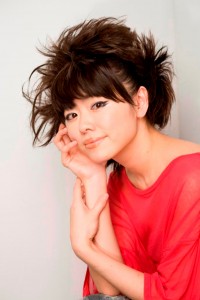Justin’s Japan: Q&A with Grammy Award-Winning Musician Hiromi on ‘Voice’

"I went back to Japan right after the earthquake and did a lot of live radio and TV shows to perform live to cheer people up. I just wanted to do something for the country I love and only thing I could do was keep playing music, so I kept playing." (Sakiko Nomura)
By JQ magazine editor Justin Tedaldi (CIR Kobe-shi, 2001-02) for Examiner.com. Visit his page here for related stories.
A native of Hamamatsu, Shizuoka, pianist and composer Hiromi Uehara is one of the world’s top young international performers in jazz, winning a Grammy earlier this year for her work on Stanley Clarke’s most recent album. Today (June 7), she releases Voice, her seventh studio effort since 2003 and first as part of the Trio Project with bassist Anthony Jackson (Paul Simon, the O’Jays, Steely Dan, Chick Corea) and drummer Simon Phillips (the Who, Judas Priest, David Gilmour, Jack Bruce).
“When I play music, I realize that it really filters emotions,” says Hiromi. “I called this album Voice because I believe that people’s real voices are expressed in their emotions.” Tonight, the Berklee College of Music alum launches a six-night residency at New York City’s venerable Blue Note Jazz Club as part of its inaugural Blue Note Jazz Festival. I caught up with the artist in this exclusive interview.
What kinds of goals in mind do you have when you record a new album? How about for a concert?
Making an album is like I have stories to tell; I want to see the landscape in music that I have never seen before. For a concert, I always think today is my first and last, trying to put everything I have out.
A big part of your style is your quicksilver runs across the keys. How did you develop this as your trademark, and are there ever times in concert when you feel like it’s a challenge to keep up that manic pace?
I never really thought about it as my trademark, I just play what I hear, what I have to say at that very moment, just like a conversation.
The toughest part of your job onstage that the audience might not realize is…
Definitely traveling.
I’ve noticed that you’ve been speaking a lot more English for interviews and at your concerts. Are you continuing to study it, and what kind of methods or techniques do you use that you can recommend to others who are learning a second language?
I do watch a lot of movies in English. Don’t be afraid to make mistakes, speak speak speak!
In what ways has the Japanese music community banded together in the wake of the earthquake and tsunami devastation? What has your impression been of the United States and its entertainers’ relief efforts?
I went back to Japan right after the earthquake and did a lot of live radio and TV shows to perform live to cheer people up. I also went back in April to do eighteen benefit shows in Tokyo. I just wanted to do something for the country I love and only thing I could do was keep playing music, so I kept playing. I really would like to thank everyone from the U.S. for their efforts. We surely need continuous support and I will keep doing whatever I can do.
For the rest of the interview, click here.


Comments are closed.